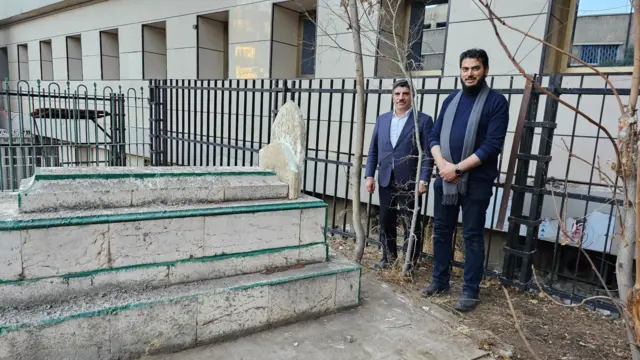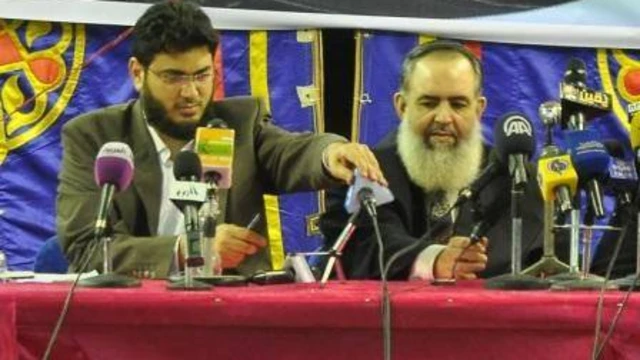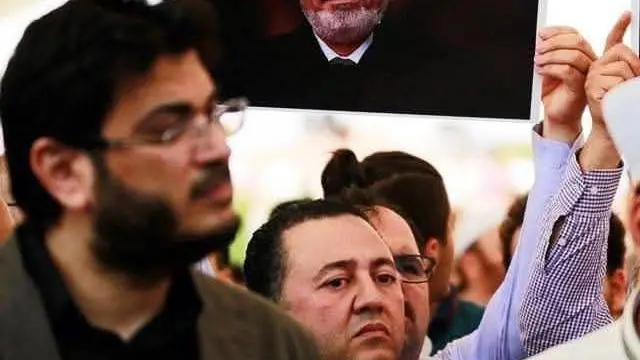
image source, SocialMedia
A major controversy was sparked by the appearance of the Egyptian Mahmoud Fathi, who was sentenced to death in Egypt, with the leader of Hay’at Tahrir al-Sham, Ahmed al-Sharaa (Abu Muhammad al-Julani), and Yassin Aktay, advisor to Turkish President Recep Tayyip Erdogan in Syria after the fall of al-Assad’s rule.
Reactions varied regarding Turkey’s relationship with Hay’at Tahrir al-Sham and the implications of the appearance of an Egyptian convicted of “terrorist” crimes, wanted by justice in Egypt, and moving freely between Syria and Turkey, despite the recent normalization of relations between Cairo and Ankara and the exchange of visits between Turkish President Recep Tayyip Erdogan and Egyptian President Abdel Fattah al-Sisi.
Who is Mahmoud Fathi? How many cases have he been convicted of? What is he doing in Türkiye?
His full name is Mahmoud Muhammad Fathi Badr. According to the list of terrorist entities recently issued by Egypt, he is convicted in several cases related to terrorist activities, and is sentenced to death in the case of the murder of Egyptian Attorney General Hisham Barakat. According to the list, his “terrorist” activity against Egypt is still continuing from Abroad until the current year 2024.

image source, SocialMedia
Based on his account on the
He also published pictures of himself with Aktay and other leaders of Hay’at Tahrir al-Sham in several Syrian cities, including: Aleppo, Homs, and the Umayyad Mosque in Damascus after the fall of Assad’s rule.
Founder of the Virtue Party

image source, SocialMedia
As for his activity in Islamic organizations, his role became prominent after the “Revolution of January 25, 2011.” He was one of the founders of the Salafist “Virtue” Party in October 2011, and he was one of the prominent figures in the Islamic movements in that period. He founded the Hazmoun Movement, to promote the leadership. The Islamist Hazem Salah Abu Ismail, and appeared with him in several meetings.
Mahmoud Fathi recently re-published a photo of himself with Abu Ismail, through his account on the X platform.
He also wrote on his account that “he was among the members of Hazemoun, and that he convinced former Egyptian President Mohamed Morsi to hold a conference in support of the Syrian revolution in June 2013 entitled (At Your Home, Syria), which was held by the Brotherhood.” He also said that he “participated in the siege of the embassy.” The Syrian woman at the time was with Hazem Salah Abu Ismail.
Following the “June 2013 Revolution,” in which the army overthrew former President Mohamed Morsi after popular protests against him, Fathi fled to Turkey and settled there, continuing his political activity and calling for demonstrations in Egypt through his account on the X platform.
In 2015, his name came up in the case of the assassination of the Attorney General as one of the instigators and planners of it from Turkey. The Egyptian government included him on terrorism lists and asked Interpol to pursue him, and Turkey refused to extradite him to Egypt.

image source, SocialMedia
His name was also mentioned in other cases, including what is known as the “Helwan Brigades,” and the “targeting security ambushes” case that was examined by the military judiciary. He also constantly called for revolution in Egypt and criticized the current authority. He also called for changing the Egyptian flag and returning to the green royal flag with the crescent and stars. Close to the flag of Turkey.
By reviewing the lists of terrorist entities issued by the Egyptian authorities, Mahmoud Fathi Badr’s name appeared about six times on the list, and he is wanted in a number of cases, namely Case No. 4459 of 2015 Helwan Felony, Case No. 314 of 2015 Supreme State Security Inventory, and Case 760 of 2017 State Security Inventory. Supreme Court, Case No. 620 of 2018, Supreme State Security, as well as Case No. 1781. For the year 2019, the Supreme State Security Inventory, and Case No. 571 for the year 2020, the Supreme State Security Inventory.
Death sentence
The first absentee ruling was issued against Mahmoud Fathi in February 2017, and the first absentee ruling was issued against Fathi to 15 years in prison in Case No. 89 of 2015, Supreme State Security, a case known in the media as “targeting security ambushes.”
In July 2017, a death sentence was issued against him in absentia in the case of the assassination of former Public Prosecutor Hisham Barakat, among 28 other defendants, including 9 defendants in attendance.
According to what was stated in the investigations, the Egyptian authorities accused Mahmoud Fathi of planning the operation from Türkiye with other leaders of the Brotherhood, which the Egyptian government classified as a “terrorist group.”
In June 2022, a third sentence was issued against him in absentia to life imprisonment, for planning and financing the case known as the “Helwan Brigades,” which carried out “terrorist” operations in Egypt in the period from 2013 to 2015, amounting to 32 operations targeting the security services. Facilities belonging to the Ministry of Interior, road networks, and sabotage of high-voltage electricity towers and lighting poles.

